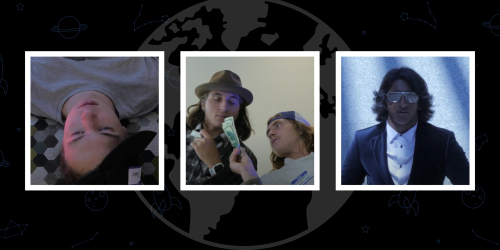This month, audiences can screen Tomato Records on the Planet Classroom Network. This film is curated by Planet Classroom.
Directed by Grant Lee Bomar and co-written by Grant and Dean Bomar, Tomato Records follows the struggling journey of a young rap star who is being hunted down by a rival musician. Hector Dravid, aka Yung Elder the Rapper, fears for his life as he is being pursued by a country music star. He turns to a freelance secret agent for protection as Hector deals with fears for his life and battles his own personal demons.
The Global Search for Education is pleased to welcome Grant Lee Bomar.
Grant, what inspired you and your brother to create Tomato Records, and how did you come up with its unique storyline?
The writing process for Tomato Records was an expedited, unique system. At first, the four of us—myself, Dean, Ethan, and Cal—experimented with potential narrative mechanics and characters. Dean posited the duality of the protagonists being the same character, Cal came up with the quirky rapper and country singer characters and the incorporation of music as the vehicle for narrative conflict, and Ethan brought the idea of a secret agent being the internal manifestation of Hector. Then I took the parts and put together an outline of scenes. We partitioned who would write each scene, and I stitched together the separate scenes into the narrative at the end.
How did you balance your multiple roles in the film as a co-writer, director, and lead cast member?
Once the script was written, I was able to focus most of my efforts on directing. My role was important to the narrative as a lead antagonist but rather small in screen time, so it didn’t interfere much. The shoot went rather smoothly, being the only film project I’ve worked on where production consistently ran ahead of or on schedule. I attribute this to the entire team sharing a vision for what the film would be and doing their roles well.
Can you describe the creative process behind the film’s surreal and fantastical elements?
The sequence at the end of the film where Hector’s personalities merge together was made by rotating lights with colored gels in circles around the actors’ faces and then speeding it up in post-production. Ethan’s laughing during the sequence was an unscripted, candid moment that worked well, so we kept it in post. The quirky nature of the narrative and character conflicts was inspired by the works of the Coen Brothers, who manage to blend surreal characters and comedy into mundane environments with engaging storylines.
What message or theme do you hope audiences take away from Hector Dravid’s journey in the film?
Tomato Records was an early version of an idea that we’ve been exploring in our films. We like to experiment with the power of the mind and the concept of different perceptions of reality creating new worlds from differing perspectives on the same patterns. The theme for audiences is the power of perception on reality. In this film, the secret agent is the internal strength of Yung Elder’s personality. If you can see and believe a different, improved version of yourself, which in this case is manifested physically for the protagonist, you can make it real.
Thank you, Grant!
C. M. Rubin with Grant Lee Bomar
Don’t miss Tomato Records, now streaming on the Planet Classroom Network. This film is curated by Planet Classroom.







Recent Comments